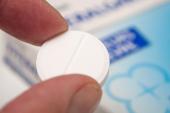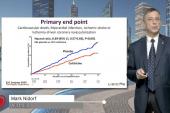Colchicine in STEMI Fails to Reduce Infarct Size: COVERT-MI
The results don’t detract from the anti-inflammatory’s earlier promise in LoDoCo2 and COLCOT, says Nathan Mewton.

Colchicine fails to protect against myocardial injury in STEMI when given at the time of reperfusion then continued for 5 days after, according to data from the randomized COVERT-MI. There also is a hint of harm: the incidence of LV thrombus was tripled among patients taking the anti-inflammatory compared with placebo.
The results were presented as part of this week’s European Society of Cardiology Congress and published online ahead of print in Circulation.
Lead author Nathan Mewton, MD, PhD (Hôpital Cardio-Vasculaire Louis Pradel, Lyon, France), told TCTMD the COVERT-MI findings were a disappointment. But he said colchicine’s lack of efficacy in acute MI doesn’t detract from the positive LoDoCo2 and COLCOT trials, which reignited interest in the inflammatory hypothesis. Both focused on chronic coronary disease and involved a daily dose of 0.5 mg. Indeed, an analysis from LoDoCo2, published earlier this week, showed colchicine to be of benefit in chronic CAD no matter how many months or years had passed since the index acute coronary event.
COVERT-MI, in contrast, used a colchicine loading dose of 2 mg followed by 0.5 mg twice daily, and it looked at “myocardial inflammation at the acute phase of infarction,” he explained.
“What our study points out is that you have to be very cautious at the acute phase,” Mewton said. Specific to LV thrombus, “we might have hit on something. It needs to be further assessed. For me, it shows that this inflammatory response is really complex and also at the same time fascinating.”
Moreover, he hasn’t abandoned hope that an anti-inflammatory drug, either a different type or colchicine at another dose and duration, might prove useful in the acute setting.
No Difference at 5 Days or 3 Months
For the double-blind COVERT-MI trial, researchers at 10 tertiary centers in France enrolled 192 STEMI patients referred for primary PCI, randomizing them to receive oral colchicine or placebo from admission to day 5.
Ultimately, there were 80 colchicine patients and 81 placebo patients in the intent-to-treat analysis. The primary efficacy outcome was infarct size at 5 days on late gadolinium enhancement cardiac magnetic resonance (CMR) imaging. Mean values didn’t differ between the colchicine and placebo groups (26 vs 28.4 g of LV mass; P = 0.87).
By 3-month follow-up, there was no difference in LV remodeling between the two study arms (mean change in LV end-diastolic volume +2.4% vs -1.1%; P = 0.49). Nor was there a difference in infarct size (mean 17 vs 18 g of LV mass; P = 0.92).
Yet investigators also report there was an “unexpected significant increase of LV thrombus at 5 days” with colchicine compared with placebo (22.2% vs 7.4%; P= 0.01). Baseline predictors were culprit arteries being the left main or left anterior descending, as well as the use of thrombus aspiration in PCI. On the CMR follow-up at 3 months, though, rates were similar between the two groups (5.3% vs 2.6%; P = 0.68). Ischemic strokes occurred in two patients randomized to colchicine and one randomized to placebo, a nonsignificant difference; none of the three strokes were in patients who’d had LV thrombus.
What our study points out is that you have to be very cautious at the acute phase. Nathan Mewton
While the LV thrombus increase could be related to chance, it’s strong enough to merit a closer look, Mewton said. The phenomenon could be caused by a rebound effect related to stopping colchicine at 5 days, he suggested, or perhaps the drug activates different pathways, both pro- and anti-inflammatory, in the acute phase. Based on prior evidence, though, “there’s no reason why it should cause thrombosis. There’s no data showing a prothrombotic effect of colchicine,” he commented.
Up next, said Mewton, they are submitting more detailed data on LV thrombus from COVERT-MI for presentation at the American Heart Association meeting. They also plan to conduct a similar trial that involves corticosteroids; these anti-inflammatories have more side effects, he acknowledged, but their “effect is broader and more powerful.”
This may not be the last word on colchicine in STEMI, however, as Mewton is also interested in testing a 1-month regimen of colchicine that consists of 0.5 mg daily without a loading dose. The peak of inflammation is around 48-72 hours after reperfusion, he noted, but myocardial scar formation continues through 1 month.
Caitlin E. Cox is Executive Editor of TCTMD and Associate Director, Editorial Content at the Cardiovascular Research Foundation. She produces the…
Read Full BioSources
Mewton N, Roubille R, Bresson D, et al. Effect of colchicine on myocardial injury in acute myocardial infarction. Circulation. 2021;Epub ahead of print.
Disclosures
- Mewton reports no relevant conflicts of interest.





Comments